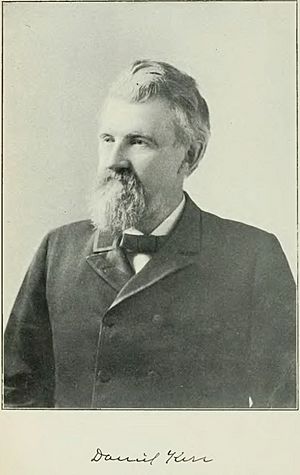Daniel Kerr (politician) facts for kids
Quick facts for kids
Daniel Kerr
|
|
|---|---|
 |
|
| Member of the U.S. House of Representatives from Iowa's 5th district |
|
| In office March 4, 1887 – March 3, 1891 |
|
| Preceded by | Benjamin T. Frederick |
| Succeeded by | John Taylor Hamilton |
| Personal details | |
| Born | June 18, 1836 Dalry, North Ayrshire, Scotland |
| Died | October 8, 1916 (aged 80) Grundy Center, Iowa, U.S. |
| Political party | Republican |
Daniel Kerr (June 18, 1836 – October 8, 1916) was an important politician from Iowa. He served as a U.S. Representative for two terms in the 1880s. He started as a member of the Republican Party but later joined the Democratic Party.
Contents
Early Life and Education
Daniel Kerr was born on June 18, 1836, near Dalry, North Ayrshire, Scotland. When he was five years old, in 1841, he moved to the United States with his parents. They settled in Madison County, Illinois.
He went to local schools and later graduated from McKendree College in 1858. After college, he studied law. In 1862, he became a lawyer and started his own practice in Edwardsville, Illinois. In 1861, he married Clara Theresa Estabrook.
Military Service
During the American Civil War, Daniel Kerr joined the Union Army. He enlisted on August 12, 1862. He was promoted to second lieutenant in 1863. The next year, in 1864, he became a first lieutenant. He served in the 117th Illinois Volunteer Infantry Regiment.
Early Political Career
After his military service, Daniel Kerr began his political career. From 1868 to 1870, he was a member of the Illinois House of Representatives. In 1870, he moved to Grundy Center, Iowa. There, he continued to practice law and also worked as a farmer. He also served his community as a school director in 1875.
In 1877, he was elected mayor of Grundy Center. This was an important local leadership role. In 1883, he was elected to the Iowa House of Representatives.
Serving in Congress
In 1886, Daniel Kerr decided to run for Congress. He wanted to represent Iowa's Fifth District. He won the Republican nomination after a tough campaign. His newspaper, the Grundy Center Argus, helped him. He was known for fighting corruption. He also helped bring the Burlington railroad to his community.
Kerr was elected to the Fiftieth Congress. He defeated the person who held the seat before him, Benjamin T. Frederick. He was re-elected in 1888 for the Fifty-first Congress. He served in Congress from March 4, 1887, to March 3, 1891. After serving two terms, he decided not to run again in 1890. He then went back to practicing law.
Changing Political Parties
Daniel Kerr was a delegate to the Republican National Convention in 1888 and 1896. A delegate is someone chosen to represent their area at a big political meeting. In 1896, he changed his mind about an important economic issue. He supported the "free coinage of silver." This idea was more popular with the Democratic Party at the time. The Democratic presidential candidate, William Jennings Bryan, also supported it.
Because of this, Daniel Kerr decided to switch parties. He became a Democrat. In 1900, he tried to get elected to his old seat in Congress as a Democrat, but he was not successful.
Later Years and Death
In 1909, Daniel Kerr moved to Pasadena, California. He lived there for several years. In 1916, he returned to Grundy Center, Iowa. He passed away there on October 8, 1916, at the age of 80. He was buried in Rose Hill Cemetery.
 | Shirley Ann Jackson |
 | Garett Morgan |
 | J. Ernest Wilkins Jr. |
 | Elijah McCoy |

